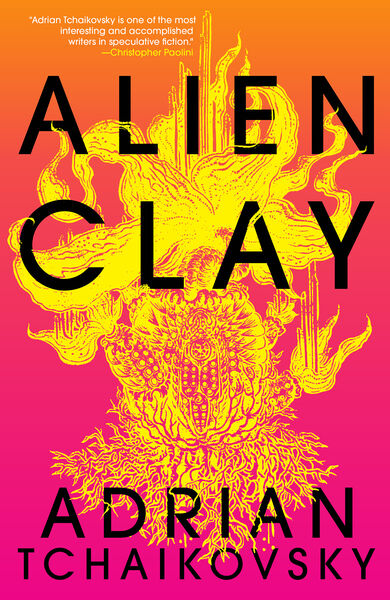Always Burning
Alien Clay
By Adrian Tchaikovsky

14 Jan, 2025
0 comments
Adrian Tchaikovsky’s 2024 Alien Clay is a stand-alone science fiction novel.
The Mandate, possessing as it does the correct views on every subject, discourages deviation from the one true path. Professor Arton Daghdev and his colleagues believed that science fell into a gray zone. In fact, the Mandate’s apparent tolerance for unsanctioned hypotheses was a ruse to get foolish academics to expose themselves… so they could be arrested.
Daghdev, no fool, worked out what the Mandate was up to as soon as he was purged, arrested, questioned, convicted, put into suspended animation, and dispatched on a one-way trip to Imno 27g, also known as Kiln. This is a death sentence, albeit a slow one.
The Mandate has contacted almost eighty exoplanets, of which only eleven were deemed worth human occupation. Kiln is one of these eleven. It is home to a thriving, superficially Earth-like biosphere. Humans don’t have to worry about being frozen, boiled, smothered, or poisoned on Kiln. They do have to worry about being masticated, infested, or dismantled and repurposed on a chemical level by the endlessly protean local lifeforms.
Daghdev soon discovers that Commandant Terolan is wrestling with a scientific enigma he has yet to mention to the Mandate back on Earth. Kiln is not just life-bearing. Ruins prove it was once home to a thriving civilization. Alien civilizations don’t fit nicely into Mandate doctrine. The problem facing Terolan is to explain the ruins without so offending his masters that they purge him for scientific deviance. Or rather, this is the problem Terolan demands his subordinates solve.
Daghdev is a xenobiologist. He therefore is assigned to help solve the problem. Daghdev is a political prisoner. He is therefore a low ranked assistant to prudently conformist functionaries. This isn’t exactly safe but it’s safer than the duties assigned to less useful prisoners.
Kiln’s biosphere solved the problem of complex life very differently than did Earth. Sideways transference of gene-equivalents is common at the macrobiotic level, not just down among the bacteria analog. Useful traits spread astonishingly fast. Also, symbiosis is the rule. What appear to be individual animal or plant analogs are usually communities of cooperating lifeforms.
Kiln life is keen to fit humans into the system. This is very often fatal to humans. Those who do not die often go mad as their bodies are invaded and their organs coopted or replaced by local lifeforms. This makes studying the ruins problematic, but it does provide Terolan with a useful stick. Every prisoner will die on Kiln, but useful prisoners die later.
The Mandate is far away. Terolan’s trusted staff are outnumbered by the prisoners. Revolt is therefore inevitable. Terolan being no fool, he has counter-measures in place. One failed uprising later and Daghdev finds himself demoted. Now the scientist will have his chance to examine Kiln life out in the field.
Revelations await!
~oOo~
I’ve used the US cover but there’s also a UK cover. Not sure which one I prefer.

I find it fascinating that many SF authors seem to find it very difficult to imagine how stupid and corrupt doctrinaire, totalitarian regimes often are. Actual totalitarian regimes are filled with functionaries whose ability to insert themselves into hierarchies is not accompanied by competence on the job. State policies are immune from reasonable assessment. Thus, people like Russia’s Lysenko and programs like China’s Four Pests campaign, not to mention technological achievements like Chernobyl.
The Mandate are an assortment of brutes and conformists, who judge everything by its adherence to current orthodoxy. Nevertheless, their orthodoxy is close enough to reality to be functional.
Example: the Mandate has impressive starships. It has suspended animation. There is equipment that doesn’t work well but only because it is intentionally crappy, to make successful rebellions much harder. The inefficiencies and cruelties are deliberate and intentional, not an unavoidable byproduct of the political system.
There is one exception to the Mandate’s general competence, which is that their commitment to Humanity Uber Alles blinds them to the possibility that there may be Something Out There that humans would be well advised to avoid. A biosphere that reacts to change orders of magnitude faster than Earth’s does would be a fine example.
Alien Clay paints a vivid dissident’s‑eye-view of totalitarianism, the way in which it works its way into every facet of life, and the methodical manner in which its subjects are compelled to distrust and betray each other to save themselves1.
I also liked the scientific puzzle; it was intriguing and not solved in the manner I expected2.
This was definitely a book worth the time spent reading it. I rather wish that I could have found time for it earlier.
Alien Clay is available here (Amazon US), here (Amazon Canada), here (Amazon UK), here (Apple Books), here (Barnes & Noble), here (Chapters-Indigo), and here (Words Worth Books).
1: I suspect Tchaikovsky was mostly thinking of the old Soviet regime.
2: Clearly alien ruins. Obviously star-faring aliens tried to settle on Kiln and were overwhelmed and consumed. Nope, wasn’t this at all. Not telling you anything more.
